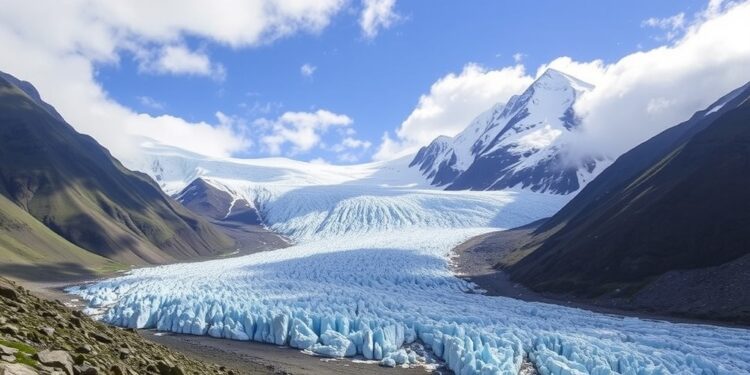As glaciers around the world continue to retreat, the Andean glaciers have emerged as a significant concern, posing an existential threat to the water supply for approximately 90 million people across South America. The alarming rate at which these glaciers are shrinking—measured at about 0.7 meters annually, which is 35% faster than the global average—illustrates the dire impact of climate change on essential water resources. Experts warn that this rapid glacial retreat endangers not just drinking water supplies but also agriculture, hydroelectric energy generation, and overall water security for millions who depend on these crucial environments.
These glaciers, perched high in the Andes mountain range—which spans several countries, including Argentina, Chile, Bolivia, Peru, Ecuador, and Colombia—have been integral to the region’s overall environmental and economic stability. Historically, they have acted as natural reservoirs, storing water in solid form during winter months and slowly releasing it during warmer periods. This seasonal melt is vital for domestic consumption, irrigation of crops, and sustaining livestock farming, among other uses. Nevertheless, as climate change continues to intensify, the reliability of these glacial systems has come into question. Scientists highlight that the ongoing environmental shifts result from rising global temperatures, which magnify extreme weather events and create disturbances in both snow and rainfall patterns.
At the heart of the issue is the connection between atmospheric carbon emissions and the accelerating rate of climate change. The Intergovernmental Panel on Climate Change (IPCC) has routinely discussed the adverse effects of unchecked greenhouse gas emissions since its inaugural report in 1990. Despite these warnings, the international community has not yet made significant strides toward curbing emissions, allowing the trend of glacial shrinkage to continue unabated. The latest research from universities such as Sheffield and Newcastle reinforces the urgent need for real action, as the predicted scenarios indicate a potential total loss of glaciers in the Tropical Andes by the end of the century.
The implications of glacier loss extend far beyond the melting ice itself. The vulnerabilities faced by freshwater resources are compounded by changing human and natural systems alongside shifting supply and demand dynamics. As glaciers dwindle, the quantity of available freshwater decreases, leading countries to explore expensive alternatives like large-scale water storage infrastructure. Building dams and reservoirs requires significant capital, a challenge for poorer countries that are often among those most susceptible to the adverse impacts of climate change. This investment dilemma generates difficult questions about equitable access to water resources and regional resilience in the face of inevitable environmental changes.
The consequences of climate change are becoming starkly evident as rising air temperatures pave the way for potentially catastrophic scenarios. Pervasive droughts, diminished snowfall, and increasing temperatures are manifesting across the Andean region, compromising the glaciers we rely upon for water security. The trends highlighted in the newly released policy brief emphasize that the shrinkage of these glaciers is not a future problem—it’s a current reality that demands immediate and sustained action. As current projections estimate global temperatures could exceed 2°C over pre-industrial levels, the urgency of the situation cannot be overstated.
Policymakers are thus confronted with the overwhelming task of re-evaluating climate strategies and implementing comprehensive measures to curb emissions while ensuring water security for all affected communities. The Paris Agreement of 2015 set a crucial target to limit temperature increases, but with recent data indicating that these limits have already been breached, the need for action is more pressing than ever. Failure to confront climate change effectively will exacerbate water shortages, reduce agricultural outputs, boost economic instability, elevate sea levels, and produce irreversible damage to ecological systems.
Significant progress in mitigating these dire outcomes can only be achieved through collective, global efforts. As the scientific community calls for heightened collaboration, there is also a growing understanding that successful climate policy must incorporate adaptable management strategies that consider the dynamic interplay of natural resources and human demand. The distressing reality is that while scientists and experts continuously push for effective responses, existing targets have largely been missed, underscoring a deficiency in global commitment and action.
Dr. Jeremy Ely from the University of Sheffield’s School of Geography and Planning poignantly notes that the alarming loss of ice in the Andean region warrants immediate attention. Without prompt intervention, millions of people relying on freshwater resources may face unprecedented challenges, including water scarcity and heightened food insecurity. The ongoing climate crisis threatens to destabilize entire communities reliant on glacial meltwater for agriculture and basic survival. With predictions suggesting a temperature increase of up to 4.5°C by the end of the century, communities in the Andes and beyond are at risk of significant hardship and disruption.
To that end, the scientific community stresses the necessity for a paradigm shift in how we approach climate mitigation and adaptation. Achieving a decrease in carbon emissions is essential for preserving glacier ecosystems and maintaining the water supply for future generations. Devising policies that are responsive to scientific findings is critical in navigating the complexities of climate impacts while ensuring fairness and sustainability. Without decisive action and global cooperation, the challenges posed by melting glaciers will only multiply, revealing the intricate link between climate health and human survival.
As glaciers worldwide face this ongoing crisis, the need for widespread public awareness, proactive policy changes, and sustainable management practices has never been clearer. The time for effective climate action is now, as delaying further will exacerbate risks not only for communities across the Andes but for our shared planet. The path forward will require innovative solutions and collaborative commitment on a global scale, as this environmental issue transcends borders and beckons collective responsibility in protecting vital freshwater resources.
Subject of Research: Impact of Andean Glaciers on Water Security
Article Title: Shrinking Andean Glaciers: A Threat to the Water Security of Millions
News Publication Date: [To be added]
Web References: [To be added]
References: [To be added]
Image Credits: [To be added]
Keywords: Glaciers, Climate Change Mitigation, Water Supply, Carbon Emissions, Climate Policy




